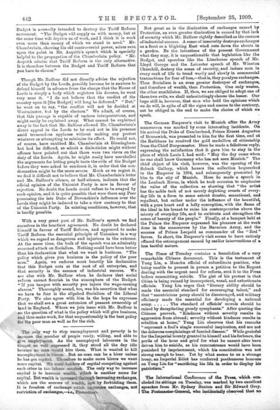The German Emperor's visit to Munich after the Army rnanmuvres
was marked by some interesting incidents. on his arrival the Duke of Cumberland, Prince Ernest Augustus of Brunswick, was presented to him for the first time, and at the Rathhaus be received the gold medallion of citizenship from the Chief Burgomaster. Here he made a felicitous reply, expressing the satisfaction that it gave him to stay in the place of which Louis I. had said : "May the day come when no one shall know Germany who has not seen Munich." The chief object of his visit, however, was the opening of the Schack Gallery, which houses the collection bequeathed to the Emperor in 1894, and subsequently presented by him to the city of Munich. Here he made a speech in the Lenbach Room, in which he took occasion to emphasise the value of the collection as showing that " the artist has the noble task of not merely depicting events of every- day life in a form to some extent drastic, sensational, and repellent, but rather under the influence of the beautiful, with a pure heart and a lofty conception, with the flame of the ideal in his breast to raise his contemporaries above the misery of everyday life, and to cultivate and strengthen the sense of beauty of the people." Finally, at a banquet held at the Palace the Emperor expressed his pleasure at the work done in the manceuvree by the Bavarian Army, and the success of Prince Leopold as commander of the " Red" forces. In short, the Emperor's visit seems to have entirely effaced the estrangement caused by earlier interventions of a less tactful nature.










































 Previous page
Previous page